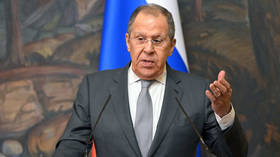Foreign tech giants to be forced to open offices in Russia as officials look to stop companies ignoring demands from regulators

Large foreign IT companies that refuse to open offices and have official representation in Russia could be completely banned from having advertisements on their websites and could be prevented from accepting any form of payment.
That’s according to Alexander Khinshtein, an MP for the ruling United Russia party, who says his proposed bill would not infringe on users’ interests but would force companies to be accountable to the country’s laws. As things stand, foreign tech companies often avoid demands from the Russian authorities, as they have no physical base inside the country, and ignoring legal requests typically goes unpunished.
“Our bill would oblige owners of large information resources with a daily audience of more than 500,000 people in Russia to open official representative offices to fully represent their interests and be responsible for their activities, including in the government and courts,” he wrote on messenger app Telegram, noting that refusal to comply would see sanctions imposed, including a complete ban on accepting payments and restrictions on advertising.
“Unfortunately, many of the IT giants openly abuse their monopolistic position by violating the requirements of our legislation,” he explained.
According to Khinstein, the way to get compliance from foreign IT companies is to create economic incentives for them to comply with Russian legislation.
In recent months, a number of social media companies have been targeted by the Russian authorities for refusing to comply with demands to remove content. In particular, Twitter attracted the attention by Roskomnadzor, the country’s media regulator, for ignoring requests to delete thousands of posts with illegal material, including child pornography and incitements to commit suicide.
In February, Russian Foreign Ministry spokeswoman Maria Zakharova slammed Twitter as a tool of Western countries to impose a “global digital diktat,” after the website removed 100 accounts it alleged were linked to the Kremlin.
On March 5, Roskomnadzor announced that it would fine not just Twitter, but foreign-based networks Facebook, Instagram, TikTok, YouTube, and Telegram for failing to delete posts that called for teenagers to attend unauthorized protests. Two Russian websites – VKontakte and Odnoklassniki – were also fined.
If you like this story, share it with a friend!















